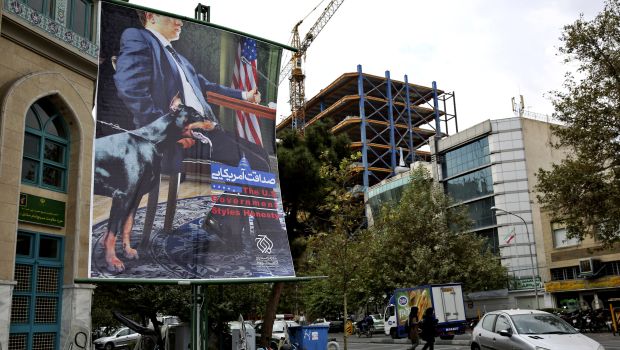
A poster depicting an American negotiator wearing a suit jacket and tie at a negotiating table and a dog to his side is displayed in Palestine Square in Tehran, Iran, on Sunday, October 27, 2013. (AP Photo/Ebrahim Noroozi)
A Tehran municipal official said the billboards had been put up illegally and that the city would take them down, state news agency IRNA reported on Saturday.
“In an arbitrary move, without the knowledge or consent of the municipality, one of the cultural institutes installed advertising billboards,” said Hadi Ayyazi, spokesman for the municipality, according to IRNA.
One of the billboards depict two men sitting across a table from one another, with Iranian and American flags in the background indicating that one of the men is American and the other Iranian. The American is shown dressed in a suit jacket and tie on his top half, but out of sight of his counterpart is a concealed a shotgun pointed at the Iranian under the table.
A slogan on the posters, in Persian and English, reads, “The US Government Styles Honesty.”
Even to less-informed observers, it is clear that these billboards have been designed and installed across the capital city for one purpose: to call into question the sincerity of the US as signs of a thaw in the two countries’ thirty-year standoff begin to appear.
The high production value of the posters has also led some to speculate that they are the work of a well-resourced organization, possibly connected with the hardline conservative Islamic Revolutionary Guard Corps, whose leadership is known to be deeply suspicious of any opening to the West.
If those suspicions are correct, the posters may represent a warning to Iranian president Hassan Rouhani that there are limits to the official support he has been given so far in his attempts to negotiate an end to the stand-off with the US.
